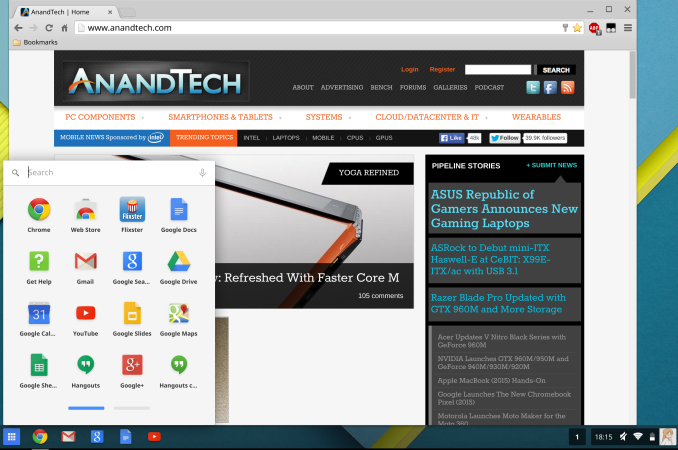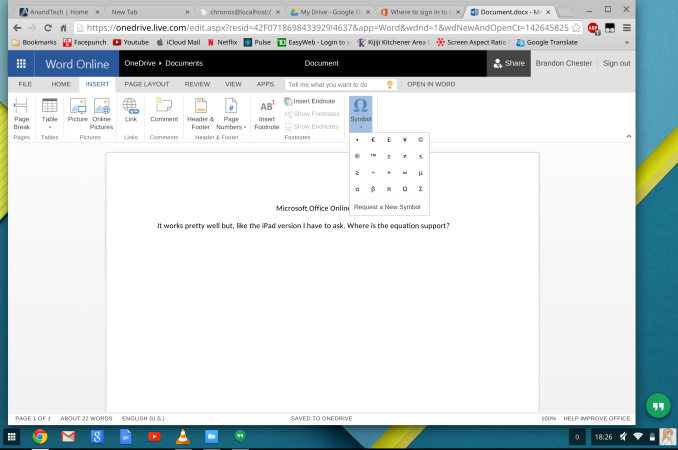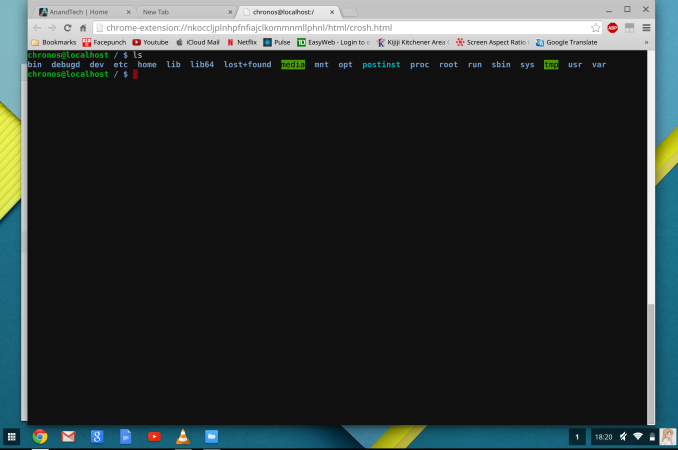The Chromebook Pixel (2015) Review
by Brandon Chester on March 16, 2015 8:00 AM EST- Posted in
- Laptops
- Chrome OS
- Chromebook
- Chromebook Pixel
Software
To tell the truth, I hadn't had much experience with Chrome OS before using the Chromebook Pixel. Years ago I installed Chromium OS to see what it was like, but I quickly wrote it off as far too limited to perform the tasks that I do on a daily basis. Since then, web applications have improved immensely, and Chrome OS itself has had new applications added and changes made to the interface to make it feel more like a typical operating system. But at its heart, it's still just Chrome and web apps, and so it was interesting to see what could be done within those bounds.
When you first get your Chromebook you'll be asked to log into your Google account. From that point, you're sent right to what could be called the home screen for Chrome OS. At the bottom you have a shortcut to Chrome, along with shortcuts to other Google products like Docs and Gmail which are actually just links to the website for each respective product. However, not all Chrome OS applications run within Chrome. There's a Calculator application which greatly resembles the Android Lollipop calculator, and a Files application to view your removable storage and downloads in addition to showing your files stored in Google Drive.
At this point you're basically ready to go. There aren't many settings to change or any applications to configure once you've signed in with your Google account. In fact, if you're already invested in Google's ecosystem you'll be able to start editing your Google Docs files and access your Google Drive immediately. I do use Google drive, but I use Microsoft Office instead of Google Docs, Sheets, and Slides for editing documents which could pose a problem. Luckily, Office has moved to the cloud and so users who don't edit their documents using Google's software aren't left out in the cold.
Unfortunately, many cloud counterparts to desktop software are missing important features. In the case of Office, you lose many formatting tools, including the ability to insert equations which is a tool I use frequently. Charts and text boxes are also removed in the cloud version of Word. I understand the need to simplify these applications when they're being run in a web browser, but it doesn't change the fact that many tools users expect to be there are missing.
How Google's office application handle files can also be somewhat problematic. I'm sure most people have been sent a file in one of Microsoft's Office formats at some point in their lives. Google claims somewhere around 90% feature compatibility with Microsoft Office files. On one hand, this is pretty impressive for software that runs in a web browser. But on the other hand, when you only have 90% feature compatibility, you're basically completely incompatible with every file that uses any feature from that last ten percent. Importing a PowerPoint file to Google Slides will cause objects like charts to just be completely erased, and I would hardly consider the use of charts in PowerPoint presentations to be uncommon.
For media playback, the default video and music applications are more than sufficient for most users. Google even has support for the Matroska container which is more than can be said for other operating systems. For playing back less common file types, or videos with subtitles, the built in players aren't quite up to the task. Luckily, the Android version of VLC is slated to come to Chrome OS in the near future via the App Runtime for Chrome. Google was able to provide me with a debug version to see how well it worked. It definitely needs some polish, but there's still quite some time between now and release, and I don't know how up to date the debug build I'm using is.
Overall, I think that Chrome OS still does a pretty good job of handling files that come from a Windows PC world. There's still work to be done though, and anybody who's considering the Pixel or any other Chromebook should understand what they're getting into.
For users who want to play around with the underlying Linux core of Chrome OS, there's a fully functional shell which is accessible via Chrome after putting the laptop into developer mode. This allows you to access more of the file system, and you can even install versions of Ubuntu or Debian using Crouton. Obviously I can't recommend doing so due to the potential security and stability risks, but the options are available for any users who are interested. The Chrome OS shell already has the ability to connect to another computer via SSH once developer mode is enabled, and it opens up a whole new world of possibilities for the Pixel.
I'm definitely more open to using Chrome OS than I was when the original Pixel launched. I know that many users would be able to do everything they currently do on Windows with a Chromebook. However, those users aren't likely to be the ones who are looking for a $1000 laptop. For me personally, Chrome OS is still too limited, and it will probably always be too limited for me to use as a primary operating system. But it's an interesting idea, and with Google working with developers to get Android applications brought over to Chrome OS there's no telling what the state of Chrome OS will be by the time a Pixel v3 rolls around.














123 Comments
View All Comments
Selden - Tuesday, March 17, 2015 - link
New Macbook: mobile processor, 480px camera, *1* USB Type-C port, 5 Gb iDrive space. $1299.New Pixel: i5, 720px camera, 2 USB Type-C, two USB Type A ports, 1 Tb of Google Drive space for 3 years. $999
I'
BackInAction - Monday, March 16, 2015 - link
I don't think Google intends for this to be something Joe Public will purchase. More of a ChromeOS Developer tool?Any comparison between this and other laptops is meaningless because it isn't meant to be compared with anything.
chlamchowder - Monday, March 16, 2015 - link
I don't know if it's the best idea to develop for a device more powerful than what most of the userbase will buy.The 64 GB version looks like a decent platform to put Linux on, as long as you don't try to store too much. After all, the lowest end original Surface Pro had 64 GB, and Windows programs tend to be heavier on storage. But I'm not sure I'd pay $1300 to tinker with Linux on it.
coder543 - Monday, March 16, 2015 - link
In general, developer machines *have* to be more powerful than the consumer machines the software will run on. Just because you're developing on a powerful rig, doesn't mean you won't test your software on weaker hardware along the way.It's not exactly the same thing, but a great example of this is game development. I literally could not run the Unreal Engine 4 development tools reliably on a Mac mini with 4GB of RAM. It would crash often due to running out of memory. Once I upgraded it to have 16GB of RAM, these problems all disappeared. UE4 allows you to develop games for everything from smartphones to the most powerful desktops, yet there is absolutely no way you could run the developer tools on a smartphone -- even if it is the platform you're targeting, and you don't think it's good to develop on more powerful hardware than you're targeting.
chlamchowder - Monday, March 16, 2015 - link
I said develop for, not develop on. I really doubt developers will want to code right on Chrome OS. They're probably following a similar model to cell phone app development, where you write/compile your code on a 'real' machine, and then package/deploy it to a test machine (cell phone, or Chromebook).With that model, using the Chromebook Pixel as a test platform might not be the best idea. An app that performs decently on the Pixel might not do so well on lower end Chromebooks.
I suppose you could drop a full blown Linux distro or Windows on a Chromebook Pixel and use it for coding...but then limited storage could be an issue.
extide - Monday, March 16, 2015 - link
But its not a *testing* platform, it's a *developing* platform. Also, great for users who'd like to put Linux on.chlamchowder - Monday, March 16, 2015 - link
Developing *on* Chrome OS seems like a horrible idea, even on the Pixel.To start, Chrome OS doesn't come with any development tools (though there's a messy way to get GCC on it). Assuming you manage to get a build environment set up, you then have to deal with very limited storage. Want to store local copies of several large projects? GLHF. Then, what about compilation times? A Broadwell i5 ULV chip is great for an ultrabook, but a desktop with an adequately cooled, higher clocked i7 will blow it out of the water.
Any laptop or desktop for the same price is much better for coding.
melgross - Monday, March 16, 2015 - link
A developer tool doesn't need to be made out of aluminum. No, Google is clearly trying to make a high end laptop to compete with Apple. Since Chrome still isn't nearly as useful as either Windows of OS X, this is a very limited device. Are they worth more than $1,000? No way nearly.Hanoveur - Monday, March 16, 2015 - link
No, Google is on record saying they gave these away to the developers at the Google Developers Conference and were simply making them available for the general public to buy. They aren't expecting to sell many of them. Look it up.And why wouldn't someone buy this? People could buy a Toyota Corolla to simply drive from point A to point B, but there are those that choose the Infinity to do exactly the same thing. It's all about preference. It might seem insane to some people, but people like what they like. Everyone elses world and tastes do not revolve around yours.
chlamchowder - Monday, March 16, 2015 - link
It's just difficult to imagine who's tastes this would fit.